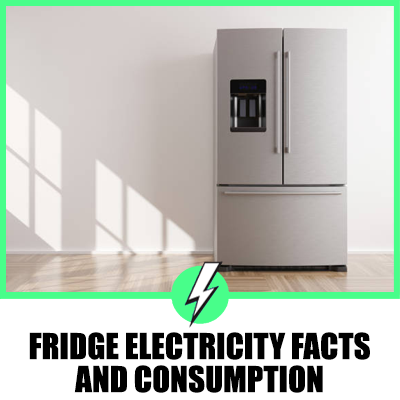Fridge Electricity Facts and Consumption: A Comprehensive Guide
Refrigerators are an essential part of our daily lives. But they also account for a significant portion of our home’s energy consumption.
In this article, we’ll explore some common questions about fridge electricity usage. We’ll also provide tips on how to reduce it. This guide is tailored for both UK and US audiences.

Contents
Does Opening the Fridge Door Waste Electricity?
Yes, opening the fridge door does indeed waste electricity.
When the door is opened, the cold air inside the fridge escapes. It is replaced by the warmer air from the room. This forces the fridge to work harder to cool down again, leading to increased energy consumption.
It’s worth noting that the impact on your energy bill can be significant. Especially if the fridge door is left open for extended periods or if it’s opened frequently. Therefore, it’s advisable to know what you need before you open the door. And to close it as soon as possible.
Is it OK to Turn Off the Refrigerator to Save Electricity?
Turning off your refrigerator can save electricity. But it’s not always practical or recommended.
Food safety is a major concern. Perishable items need to be kept at a safe temperature to prevent spoilage.
If you’re going away for a while and the fridge is empty, you could consider turning it off to save energy. However, remember that when you turn it back on, it will need to work hard to cool down. Which will use some energy.
What Happens if I Leave the Fridge Door Open?
Leaving the fridge door open for an extended period can cause several problems.
Firstly, it leads to increased energy consumption. The fridge has to work harder to maintain its internal temperature.
Secondly, the temperature inside the fridge can rise to unsafe levels. This can potentially lead to food spoilage. This is particularly a concern for foods like dairy products, meats, and other perishables. They need to be kept at a constant low temperature.
Finally, leaving the fridge door open can also cause excess moisture to build up inside the appliance. This can lead to frost and ice build-up. Which can interfere with the proper operation of the fridge and lead to further energy wastage.
How Can I Save Electricity with My Refrigerator?
There are several strategies you can use to reduce the energy consumption of your refrigerator:
- Keep the Door Closed: As mentioned earlier, try to minimize the amount of time the fridge door is open.
- Regular Maintenance: Regularly defrost your fridge, clean the coils, and check the door seals. These steps can help your fridge operate more efficiently.
- Set the Right Temperature: The fridge should be set between 3°C and 5°C (37-41°F). And the freezer should be set at -18°C (0°F).
- Load it Correctly: Don’t overfill your fridge as it can restrict airflow and make the appliance work harder. However, a completely empty fridge is also not energy efficient. Aim for a balance.
- Choose an Energy-Efficient Model: If you’re in the market for a new fridge, look for energy-efficient models. They may be more expensive upfront, but they can save you money in the long run.
Why is my fridge consuming too much electricity?
Your refrigerator is a crucial appliance in your home, but it can also be a significant source of energy consumption.
According to a post on Refrigeration Club, the main culprits behind high energy consumption in refrigerators are poor maintenance and incorrect usage.
For instance, a dirty condenser coil can reduce the efficiency of your fridge, causing it to work harder and consume more energy.
Regular cleaning and maintenance can help keep your fridge running optimally and reduce its energy consumption.
Can a refrigerator make your electric bill go up?
Yes, a refrigerator can significantly impact your electricity bill.
A post on Express.co.uk explains that if your fridge is too cold or if the freezer is full of frost and ice, it could be consuming more energy than necessary.
This is often due to the door seal allowing warm air in, which then turns into frost, or a problem with the refrigerator’s defrosting sensor.
If you notice a buildup of frost and ice in your freezer, it’s a sign that your unit is struggling to maintain the right temperature, which could be increasing your energy bill.
Why has my power usage suddenly increased?
There could be several reasons for a sudden increase in your power usage.
According to HomeServe, faulty wiring, faulty appliances, a faulty electricity meter, or a lack of energy efficiency in your home could all contribute to a higher electric bill.
For instance, faulty electrical wiring can cause appliances to heat up and consume more electricity.
Similarly, if an appliance is faulty, it could be consuming more energy than usual.
An electricity usage monitor can help you identify which appliances are using too much electricity.
Can a fridge drain electricity?
Yes, a fridge can drain electricity if it’s not running efficiently.
Express.co.uk explains that if your freezer is prone to frost buildup, it could be due to the door seal allowing warm air in, which then turns into frost, or there could be something wrong with the refrigerator’s defrosting sensor.
This can cause your fridge to struggle to maintain the right temperature, leading to increased energy consumption.
How can I save electricity with my refrigerator?
There are several ways to reduce the power consumption of your refrigerator, as outlined in a post on dmohankumar.wordpress.com.
These include:
- Using a double door fridge, as the freezer compartment doesn’t open frequently, reducing power consumption.
- Setting the temperature wisely according to the seasons.
- Checking the gasket (the rubber lining on the door) for any looseness or breaks, as this can cause the fridge to switch on continuously.
- Keeping the fridge in a well-ventilated area with a minimum 30 cm gap from the wall.
- Cleaning the compressor and coil once a month.
- Checking the line voltage, as voltage drops can increase power consumption.
- Not opening the fridge frequently.
- Not placing hot materials in the fridge.
- Not jamming the fridge with food items.
- Keeping vegetables in polythene bags to reduce the job of the fridge.
- Being aware that while a stabilizer is a must for a fridge, it also consumes power.
Insights from Online Discussions
Online discussions provide a wealth of information from people’s personal experiences.
Here are some insights:
- The Impact of Leaving the Fridge Door Open: Many users confirmed that leaving the fridge door open does increase electricity consumption. Some shared their personal experiences of significant increases in their electricity bills due to this habit.
- Faulty Appliances and High Energy Consumption: Users discussed how faulty appliances, including refrigerators, could lead to higher electricity bills. Some shared experiences of identifying faulty wiring or malfunctioning parts leading to excessive energy use.
- The Importance of Regular Maintenance: Many users stressed the importance of regular maintenance in ensuring the efficient operation of their refrigerators. This includes cleaning the coils, checking the door seals, and timely repair or replacement of faulty parts.
- Energy Efficiency Measures: Users shared various measures to improve the energy efficiency of their refrigerators. These include setting the right temperature, keeping the fridge full, and covering food.
Conclusion
Understanding your fridge’s electricity consumption can help you use it more efficiently, saving energy and reducing your electricity bill.
Remember to keep the door closed, maintain the fridge regularly, and choose energy-efficient models when buying a new one.





